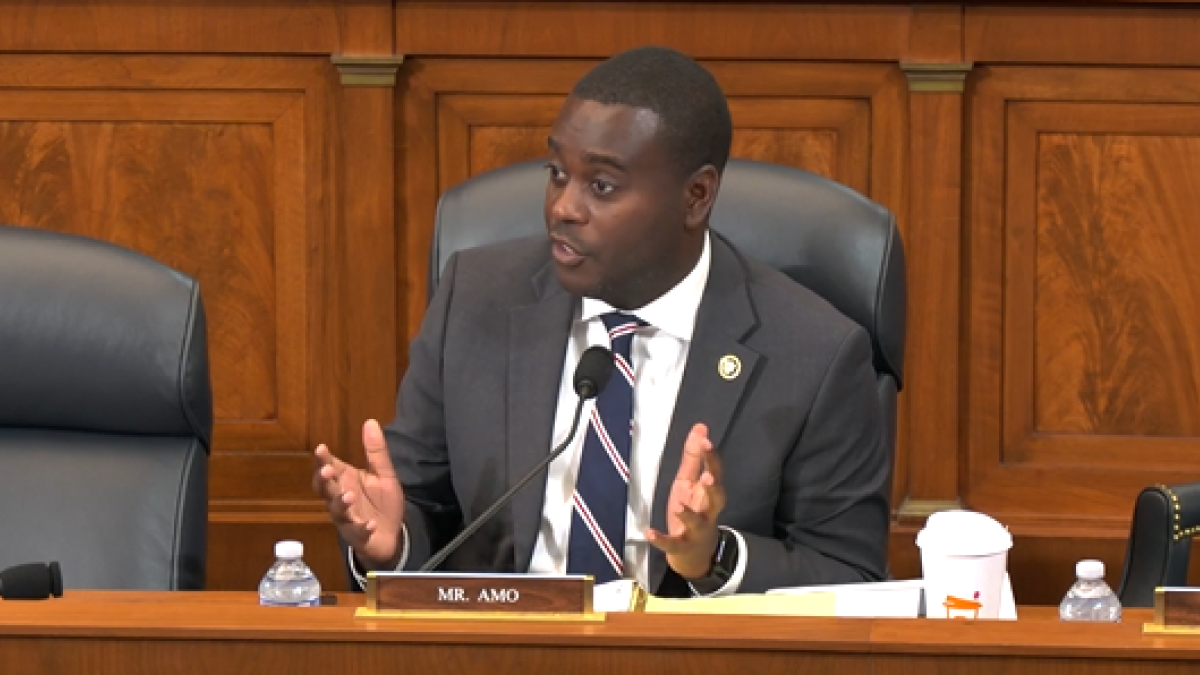Amo Highlights Rhode Island’s Role in Protecting the Indo-Pacific in Foreign Affairs Hearing

Ocean State manufacturers produce critical defense articles for the Australia, United Kingdom, United States (AUKUS) security pact
WASHINGTON, DC – Today, Congressman Gabe Amo (RI-01) participated in a House Committee on Foreign Affairs hearing on the Indo-Pacific that featured testimony from Deputy Secretary of State Kurt Campbell about the ongoing work to strengthen bilateral relationships and advance democracy in the region. At the hearing, Congressman Amo spoke about the Biden-Harris Administration’s work to strengthen the AUKUS security pact and its critical role in maintaining security and stability in the Indo-Pacific. Congressman Amo emphasized the need to tailor the International Traffic in Arms Regulations (ITAR) rules to allow for smoother transfer of information and weapons to our allies.
“In my home state of Rhode Island, we are proud of our role in AUKUS defense production, ensuring mutual security and boosting our local economy through small businesses that provide good-paying jobs,” said Congressman Gabe Amo. “That said, we need a smooth, orderly process to transfer defense articles between our nations for AUKUS to effectively deter threats and maintain security.”
Video of full hearing exchange HERE.
BACKGROUND
Rhode Island is front and center in supporting the AUKUS security pact. A substantial amount of the domestic production for AUKUS, including submarines and autonomous naval vessels, is either produced in Rhode Island or through subcontractors located in Rhode Island. The trilateral agreement allows Rhode Island the opportunity to export its expertise by establishing long-lasting research collaborations and empowering an expert workforce. In the past year alone, the Naval Undersea Warfare Center Division Newport signed a cooperative research and development agreement with Australia’s Flinders University to foster collaborative research on undersea technology.
In June, the House of Representatives passed Congressman Amo’s amendment to the Fiscal Year 2025 National Defense Authorization Act, which encourages the Department of Defense to promote and prioritize domestic manufacturing, supply chains, and research for defense articles for AUKUS to boost local economies and improve national security.
In August, the State Department issued a new ITAR rule that removes the requirement for U.S. ITAR licenses or other approvals for the export, re-export, re-transfer (in-country), or temporary import of Defense articles, the performance of defense services or engaging in brokering activities. This rule excludes the transfer of certain critical technologies like the technology and capabilities of the Rhode Island-produced Virginia-class submarine.
FULL HEARING REMARKS AS DELIVERED
Thank you, Mr. Chairman, and thank you, Secretary Campbell, for being here today.
This week, as has been noted in this hearing, we celebrated the 3rd anniversary of one of the most important security arrangements in generations —the Australia, United Kingdom, United States security pact — also known as AUKUS.
Thanks to President Biden’s work to strengthen this trilateral relationship, AUKUS is playing a critical role in maintaining security and stability in the Indo-Pacific.
The domestic benefits are worth noting too.
In my home state of Rhode Island, we are proud of our role in AUKUS defense production, ensuring mutual security and boosting our local economy through small businesses that provide good-paying jobs.
We need a smooth and orderly process to transfer defense articles between our nations for AUKUS to effectively deter threats and maintain security.
Congress has previously created exemptions to our International Traffic in Arms Regulations — or ITAR — to allow for easier transfer of information and weapons.
I know there are concerns that the ITAR rule proposed by the State Department in August excludes critical technologies that our allies need.
Technologies like engineering and capabilities of the Virginia-class submarine, which is produced in Rhode Island and is essential to fulfilling the promise of AUKUS.
Mr. Deputy Secretary, how is the State Department working with our Australian and United Kingdom partners to ensure the rules allows AUKUS to be effective while still protecting sensitive technology?
The bipartisan cooperation here alongside the State Department is essential and we’ll continue to be supportive of moving as fast as possible.
Very briefly as I close here, I do want to note the concerning increase in cooperation between Russia, China, and North Korea.
You have publicly said that you believe that China is providing Russia with material support to continue their illegal invasion of Ukraine.
In June, Vladimir Putin visited North Korea to sign a comprehensive strategic partnership that raised concerns about North Korea suppling Russia with munitions.
Do we have evidence that Russia is being provided lethal assistance in their war in Ukraine by China or North Korea? And what actions can the Administration do to deter this cooperation?
I yield back.
###